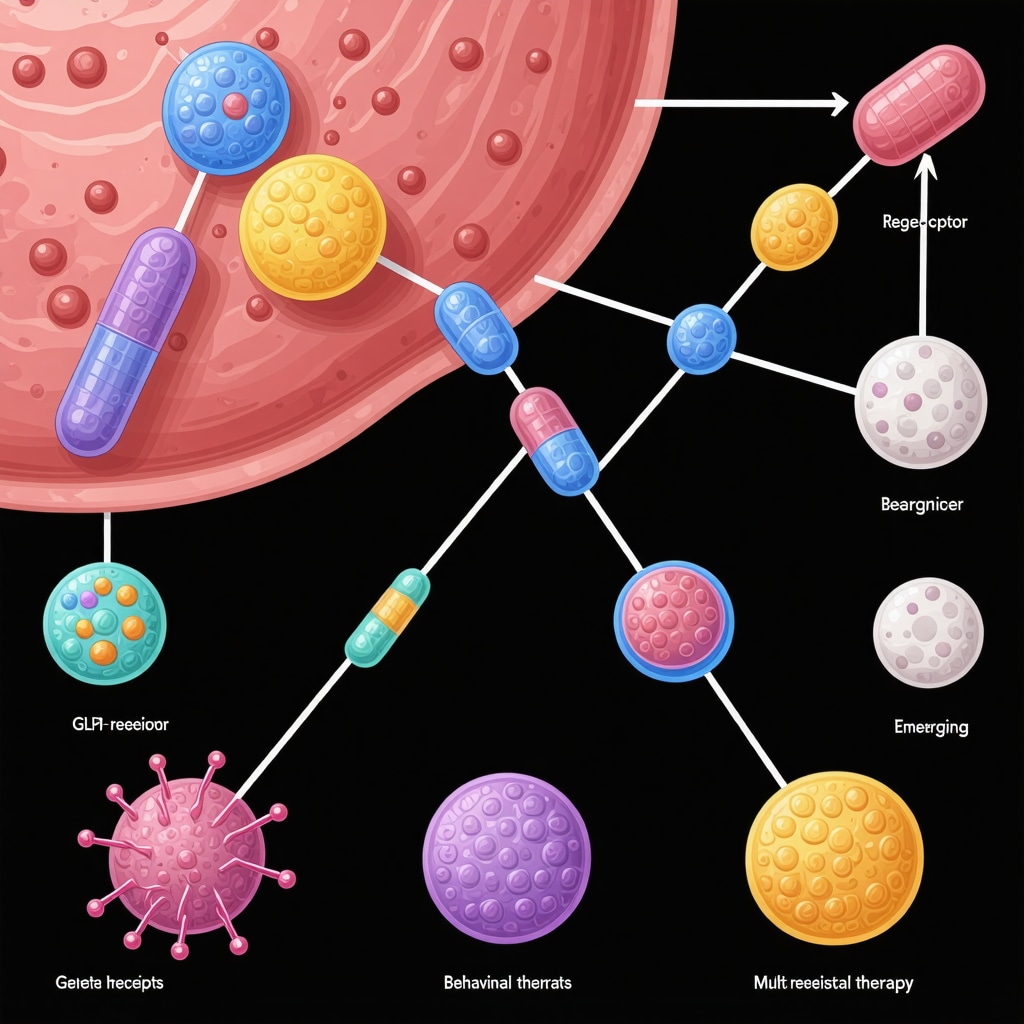Unveiling the Power of GLP-1: A New Era in Weight Loss Medication
In recent years, GLP-1 weight loss medications have revolutionized approaches to combating obesity and promoting sustainable fat loss. These drugs, originally developed for managing type 2 diabetes, have demonstrated remarkable efficacy in aiding weight reduction by targeting the body’s metabolic and appetite pathways. Unlike traditional diet pills that often provide temporary results, GLP-1 receptor agonists work on a hormonal level to create lasting changes in metabolism and satiety, offering a promising new frontier in obesity treatment.
How GLP-1 Medications Sculpt Fat Loss: The Science Explained
GLP-1, or glucagon-like peptide-1, is an incretin hormone that enhances insulin secretion and suppresses glucagon release, which in turn helps regulate blood sugar levels. Beyond glycemic control, GLP-1 receptor agonists affect the central nervous system by slowing gastric emptying and reducing appetite — mechanisms that collectively promote calorie reduction and fat loss. This dual action not only assists patients in curbing food intake but also improves metabolic efficiency, making fat loss more achievable and sustainable over time.
What Sets GLP-1 Weight Loss Medications Apart from Traditional Options?
Unlike many weight loss drugs that primarily act as stimulants or suppressants with short-lived effects, GLP-1 medications engage the body’s natural hormonal balance. This results in a more physiological approach to weight management, reducing hunger and improving satiety without the jittery side effects associated with older medications. Furthermore, clinical trials have shown consistent weight reduction outcomes, with some patients experiencing a loss of up to 15% of their body weight when combined with lifestyle modifications.
Clinical Insights: Real-World Applications and Patient Experiences
Consider the case of a 45-year-old patient with obesity and insulin resistance who struggled with conventional diets and exercise alone. Upon starting therapy with a GLP-1 receptor agonist, not only did they experience significant appetite suppression, but their metabolic markers also improved, reducing the risk of diabetes progression. Such examples underscore the transformative potential of GLP-1 medications as part of a comprehensive, doctor-led fat loss plan. To explore tailored strategies, visit doctor-led fat loss plans for personalized care insights.
Beyond Weight Loss: Additional Health Benefits and Considerations
GLP-1 receptor agonists are also linked to cardiovascular benefits, including improved blood pressure and lipid profiles, which is crucial for patients with obesity-related comorbidities. However, these medications require medical supervision because side effects like nausea and gastrointestinal discomfort can occur, especially during initiation. A balanced understanding of the benefits and risks is essential for optimizing treatment outcomes, as detailed by authoritative sources like the New England Journal of Medicine.
Embracing Innovation: The Future Landscape of GLP-1 Weight Loss Therapies
Ongoing research continues to refine GLP-1 medications, introducing newer compounds with enhanced efficacy and tolerability. Emerging therapies such as dual agonists that combine GLP-1 activity with other hormonal pathways promise even greater fat loss potential. Staying informed about these advances through expert-reviewed guides like GLP-1 weight loss medications ultimate guide empowers patients and clinicians alike to make evidence-based decisions.
Interested in personalized weight loss solutions incorporating GLP-1 medications? Share your experiences or questions below, or explore further expert guidance on doctor-prescribed weight loss plans to start your journey towards lasting fat loss today.
When Side Effects Challenge the Journey: My Personal Experience with GLP-1 Medications
Starting a GLP-1 medication felt like a breakthrough moment in my weight loss journey, but I quickly realized that the path wasn’t without bumps. The first few weeks brought bouts of nausea and occasional digestive discomfort — side effects that many patients report. At times, I questioned whether staying on the treatment was worth it. However, with the guidance of my healthcare provider and gradual dose adjustments, these symptoms lessened significantly. This experience reinforced how crucial medical supervision is when navigating weight loss drugs, ensuring safety and comfort throughout the process.
Customizing Treatment: Why One Size Doesn’t Fit All
Weight loss is deeply personal, and GLP-1 medications are no exception to the need for tailored approaches. My doctor emphasized the importance of combining medication with lifestyle changes like mindful eating and moderate exercise to maximize results. I found that tuning into my body’s responses and communicating openly with my healthcare team helped optimize the regimen. For those curious about personalized strategies, exploring doctor-led weight loss plans offers valuable insights into how customized care can make a real difference.
How do you balance the benefits and challenges of prescription weight loss medications?
This question often comes up in my community discussions. Many wonder how to reconcile the promising weight loss outcomes with potential side effects or the psychological adjustments involved. It’s important to recognize that patience and honest communication with your doctor can pave the way to a sustainable plan. This balance is a dynamic process, often requiring tweaks along the way.
Integrating Research and Real Life: Evidence Meets Experience
According to a comprehensive review published by the New England Journal of Medicine, GLP-1 receptor agonists not only promote weight loss but also contribute to improved cardiovascular outcomes in patients with obesity. This clinical evidence resonates with my personal experience and that of many others who have benefited beyond just shedding pounds. It highlights how these medications are reshaping obesity treatment paradigms with a focus on holistic health.
Finding Support and Sharing Your Story
Embarking on a weight loss journey with prescription medications can feel isolating at times. That’s why sharing experiences, questions, and triumphs with others is so valuable. If you’re navigating GLP-1 treatments or exploring other options, I encourage you to join the conversation and share your story. Whether it’s a breakthrough moment or a challenge you’ve overcome, your insights can inspire and inform others. Feel free to comment below or explore more expert advice on doctor-prescribed weight loss plans to guide your next steps.
Decoding Dose Optimization: Navigating the Fine Line Between Efficacy and Tolerability
One of the most intricate aspects of GLP-1 weight loss medication management is finding the optimal dose that maximizes fat loss while minimizing adverse effects. The titration process is a delicate dance; initiate too rapidly, and patients often experience gastrointestinal discomfort severe enough to compromise adherence. Conversely, a cautious approach might delay therapeutic benefits, potentially dampening motivation. Experts recommend a gradual dose escalation over several weeks, closely monitoring patient response and adjusting based on tolerability and weight loss milestones. This patient-centric titration strategy reflects an advanced understanding of pharmacodynamics and individual variability in GLP-1 receptor sensitivity.
Can individualized pharmacogenomics enhance GLP-1 therapy personalization?
The prospect of integrating pharmacogenomics into GLP-1 therapy personalization is an emerging frontier. Variations in genes encoding GLP-1 receptors or related metabolic pathways could influence drug efficacy and side effect profiles. While current clinical practice does not routinely incorporate genetic testing for GLP-1 medications, preliminary research suggests that such precision medicine approaches may soon refine patient selection and dosing paradigms. For instance, a 2023 study published in Metabolism: Clinical and Experimental highlighted associations between GLP-1 receptor polymorphisms and differential weight loss responses. This advancement could revolutionize how clinicians tailor obesity treatment, minimizing trial-and-error and enhancing outcomes.
Synergistic Lifestyle Interventions: Amplifying GLP-1 Medication Benefits Through Behavioral Science
While pharmacotherapy lays a robust foundation, integrating behavioral modifications is paramount for sustained success. Employing cognitive-behavioral techniques to address emotional eating, coupled with structured physical activity regimens, potentiates GLP-1-induced fat loss. Moreover, emerging evidence indicates that mindful eating practices may enhance GLP-1’s appetite-suppressing effects by modulating gut-brain axis signaling. This holistic approach underscores the importance of multidisciplinary care teams, including dietitians, psychologists, and exercise physiologists, to optimize the therapeutic milieu.
Recognizing the pivotal role of continuous support, digital health platforms now offer tailored coaching, real-time feedback, and adherence monitoring, bridging gaps between clinical visits. Such innovations are critical in overcoming the behavioral inertia that often undermines pharmacological interventions.
Mitigating Long-Term Risks: Monitoring and Managing Potential Adverse Effects of GLP-1 Medications
Although GLP-1 receptor agonists are generally well tolerated, vigilance for rare but serious adverse events remains essential. Pancreatitis, thyroid C-cell hyperplasia, and gallbladder disease have been reported, warranting regular screening protocols in high-risk populations. Additionally, the psychological impact of chronic medication use, including dependency concerns and body image disturbances, requires sensitive clinical appraisal. Establishing a risk mitigation plan, encompassing baseline assessments and longitudinal monitoring, is a cornerstone of expert care.
For clinicians and patients aiming to deepen their understanding of safety profiles and management strategies, the FDA’s comprehensive guidance on GLP-1 receptor agonists offers authoritative insights and practical recommendations.
Innovations on the Horizon: Dual and Triple Agonists Targeting Complex Metabolic Pathways
The evolution of GLP-1 weight loss medications is accelerating with the advent of dual and triple agonists that simultaneously target multiple hormones involved in energy homeostasis. Agents combining GLP-1 with glucose-dependent insulinotropic polypeptide (GIP) or glucagon receptor agonism are demonstrating superior weight loss and metabolic improvements in early-phase trials. These multi-receptor approaches epitomize the next generation of obesity pharmacotherapy, addressing the multifactorial nature of fat accumulation and metabolic dysregulation.
As these therapies progress through clinical development, their integration into personalized treatment algorithms will demand sophisticated clinician expertise and patient education to maximize benefits and minimize risks.
Curious about how cutting-edge GLP-1 combination therapies might fit into your weight loss plan? Engage with our expert community or consult your healthcare provider to explore these innovative options tailored to your metabolic profile.

Precision Medicine Meets GLP-1: Unlocking Genetic Insights for Tailored Obesity Treatment
As GLP-1 receptor agonists continue to gain traction in clinical practice, the integration of pharmacogenomics is poised to transform therapeutic personalization. Genetic polymorphisms affecting GLP-1 receptor function and downstream signaling pathways may dictate individual variability in drug efficacy and tolerability. This emerging paradigm offers the potential to preemptively identify patients most likely to benefit from specific GLP-1 compounds, while mitigating adverse effects. For instance, a 2023 study in Metabolism: Clinical and Experimental elucidates correlations between receptor gene variants and differential weight loss responses, heralding a new era of precision obesity medicine.
Behavioral Science Synergies: Enhancing GLP-1 Outcomes Through Cognitive and Lifestyle Interventions
Pharmacological intervention alone rarely suffices for sustainable fat loss; thus, coupling GLP-1 therapies with behavioral modifications is crucial. Employing cognitive-behavioral strategies to mitigate emotional eating and stress-related food cravings complements the appetite-suppressing action of GLP-1 receptor agonists. Furthermore, structured exercise programs not only augment metabolic rate but also improve insulin sensitivity, reinforcing medication benefits. Innovative digital health platforms offering personalized coaching and adherence tracking are increasingly indispensable in sustaining these lifestyle changes.
What strategies optimize the balance between GLP-1 efficacy and managing its gastrointestinal side effects?
Managing adverse effects such as nausea and delayed gastric emptying necessitates a nuanced titration approach. Slow dose escalation, patient education on recognizing early symptoms, and timing medication with meals can significantly improve tolerability. Additionally, integrating adjunctive therapies—like antiemetics or dietary adjustments—may mitigate discomfort. Multidisciplinary teams play a pivotal role in monitoring and adapting treatment plans to maintain adherence without compromising therapeutic outcomes.
Comprehensive Safety Protocols: Vigilance in Long-Term GLP-1 Therapy
Despite the favorable safety profile of GLP-1 receptor agonists, continuous monitoring for rare but serious complications remains imperative. Risks such as pancreatitis, thyroid neoplasia, and gallbladder pathology necessitate regular biochemical and imaging surveillance, particularly in high-risk cohorts. Psychological well-being should also be assessed routinely to address potential medication-related anxieties or body image disturbances. The FDA’s guidance on GLP-1 receptor agonists provides a robust framework for clinicians to implement these safety measures effectively.
Next-Generation Therapies: Dual and Triple Agonists Revolutionizing Metabolic Regulation
Cutting-edge developments in obesity pharmacotherapy include multi-receptor agonists that simultaneously activate GLP-1, GIP, and glucagon receptors. These agents harness synergistic hormonal pathways to amplify fat loss and metabolic improvements beyond what monotherapy achieves. Early clinical trials demonstrate promising efficacy and tolerability profiles, potentially redefining standard care. However, their complexity mandates advanced clinician expertise for appropriate patient selection and risk stratification.
Ready to explore how these innovative therapies and precision approaches can elevate your weight management journey? Engage with our expert community or consult your healthcare provider to tailor advanced strategies that align with your unique metabolic profile.

Frequently Asked Questions (FAQ)
What exactly are GLP-1 receptor agonists and how do they aid weight loss?
GLP-1 receptor agonists are medications that mimic the incretin hormone glucagon-like peptide-1, enhancing insulin secretion, slowing gastric emptying, and reducing appetite. This hormonal modulation leads to decreased calorie intake and improved metabolic efficiency, facilitating sustainable fat loss beyond traditional diet approaches.
Are GLP-1 weight loss medications safe to use long-term?
When properly prescribed and monitored, GLP-1 receptor agonists have a favorable safety profile. However, long-term use requires vigilance for rare adverse effects such as pancreatitis, thyroid abnormalities, and gallbladder issues. Regular clinical assessments and adherence to safety protocols help mitigate risks.
How do side effects like nausea impact treatment adherence, and how can they be managed?
Nausea and gastrointestinal discomfort are common during initiation but typically subside with gradual dose escalation. Management strategies include slow titration, timing doses with meals, dietary adjustments, and supportive therapies. Effective communication with healthcare providers is key to maintaining adherence while minimizing discomfort.
Can genetic testing improve personalization of GLP-1 therapies?
Emerging research indicates that pharmacogenomics may predict individual responses to GLP-1 medications, optimizing efficacy and reducing side effects. Although not yet standard in clinical practice, future integration of genetic insights promises more tailored obesity treatments.
How important are lifestyle changes alongside GLP-1 medication for effective weight loss?
Pharmacotherapy alone is rarely sufficient. Combining GLP-1 therapy with behavioral interventions such as mindful eating, cognitive-behavioral strategies, and regular physical activity significantly enhances fat loss outcomes and supports long-term maintenance.
What advancements are expected in GLP-1 weight loss treatments?
Next-generation therapies include dual and triple agonists targeting multiple metabolic hormones simultaneously, offering superior weight loss and metabolic benefits. These innovative compounds are undergoing clinical trials and represent the future of personalized obesity pharmacotherapy.
Who is an ideal candidate for GLP-1 weight loss medications?
Patients with obesity, especially those with comorbidities like insulin resistance or cardiovascular risk factors, may benefit. A comprehensive medical evaluation ensures appropriate selection, balancing potential benefits with individual risk profiles.
How do healthcare providers optimize dosing for maximum benefit?
Dose optimization involves gradual titration tailored to patient tolerance and weight loss progress. Close monitoring allows adjustments to minimize side effects while achieving therapeutic goals.
Are there psychological considerations when using GLP-1 medications?
Yes, chronic medication use may influence body image and psychological well-being. Integrating psychological support and monitoring for mood or anxiety symptoms enhances holistic patient care.
Can digital health tools support patients on GLP-1 therapy?
Absolutely. Digital platforms offering personalized coaching, adherence tracking, and behavioral support complement pharmacotherapy by reinforcing lifestyle changes and improving long-term success.
Trusted External Sources
- New England Journal of Medicine (NEJM): Provides peer-reviewed clinical trial data and comprehensive reviews on GLP-1 receptor agonists, including efficacy, safety, and cardiovascular outcomes essential for evidence-based treatment decisions.
- U.S. Food and Drug Administration (FDA): Offers authoritative guidance on approved GLP-1 medications, safety profiles, risk mitigation strategies, and regulatory updates critical for clinical practice and patient education.
- Metabolism: Clinical and Experimental: Publishes cutting-edge research on pharmacogenomics and metabolic pathways related to GLP-1 therapies, advancing precision medicine approaches in obesity treatment.
- American Diabetes Association (ADA): Delivers clinical practice recommendations and consensus statements that encompass GLP-1 use for weight management in patients with type 2 diabetes and obesity.
- Obesity Medicine Association (OMA): Provides specialized resources and expert guidelines on integrating GLP-1 medications into multidisciplinary obesity care, emphasizing individualized patient strategies.
Conclusion
GLP-1 weight loss medications represent a paradigm shift in obesity management, leveraging hormonal pathways to achieve significant and sustained fat loss. Their unique mechanism offers advantages over traditional therapies by improving appetite control and metabolic health while also conferring cardiovascular benefits. Success with GLP-1 therapies hinges on personalized dosing, vigilant safety monitoring, and complementary lifestyle interventions driven by behavioral science. Emerging innovations, including genetic-guided treatment and multi-receptor agonists, promise to further refine and enhance outcomes. In embracing these advanced pharmacotherapies, patients and clinicians can jointly navigate a more effective, holistic path toward lasting weight loss and improved well-being. We invite you to share your questions, experiences, or insights, and explore our expert resources to empower your weight management journey with confidence and precision.
